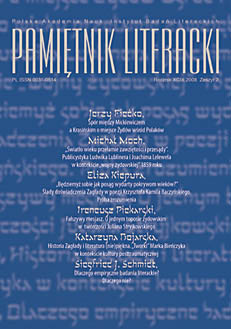Dlaczego empiryczne badania literackie? Dlaczego nie?
The Empirical Study of Literature. Why and Why Not?
Author(s): Siegfried J. SchmidtSubject(s): Literary Texts
Published by: Instytut Badań Literackich Polskiej Akademii Nauk
Keywords: empirical literary studies
Summary/Abstract: Translated from English by Agata Zawiszewska. In the first part of the paper, Siegfried J. Schmidt classifies and describes the objections (methodological, epistemological and metatheoretical) to contemporary empirical study of literature, and his counterarguments. In the second part, he presents the results of a research project devoted to tracing the types of objections which can be found in the reviews of empirical literary studies. Schmidt sees the following motives of resistance towards empirical literary studies as the most important: rejection, within their framework, the distinction between humanistic sciences and natural ones; desire for establishing a precise terminology and research methods that brings outcomes easily verifiable by all, who use the same procedure; transference of attention from a literary text – the focus of literary studies – to a literary text understood as an element of a complicated system of “literature;” the statement that the text’s interpretation is not the most important problem in literary studies but one of the many problems of it; the promotion of such concept of culture in which apart from the traditional “high” domains as religion, science, art, there is a room for equally important domains scornfully referred to as “popular culture” or “media culture.” The analysis done by the author shows that the objections in questions depend on the individual competencies and the reviewers’ prejudice rather than the established research stance in the discipline they represent.
Journal: Pamiętnik Literacki. Czasopismo kwartalne poświęcone historii i krytyce literatury polskiej
- Issue Year: 2008
- Issue No: 2
- Page Range: 107-119
- Page Count: 13
- Language: Polish

